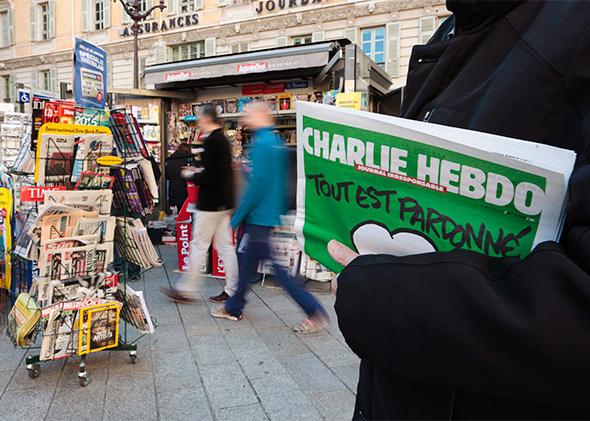The print run of Wednesday’s edition of Charlie Hebdo, the first produced since the deadly attacks on its editors last week, is on track to be the biggest in French history, according to Slate.fr. Three million copies of the satirical weekly have already been printed, and an additional 2 million are now being printed to meet demand. The issue has also been translated into multiple languages and will be shipped around the world.
By hitting the 5 million mark, Wednesday’s Charlie Hebdo will more than double the existing record for a print run of a French newspaper, which was set by France Soir on Nov. 10, 1970, the day after Gen. Charles de Gaulle’s death.
Solidarity and support for Charlie Hebdo have spread through France and beyond since last week’s attack, leading to vast interest in a newspaper that had been, like many others in the digital era, flagging. In several cities across France, people were lined up starting at dawn to snag a copy or two of the historic paper, and newsstands quickly sold out.
Much of the proceeds from the first million copies sold will be donated to the victims’ families, Slate.fr says.
France Soir’s record printing ran to 2.3 million copies on the evening that Charles de Gaulle’s death was announced. Other record printings date from throughout the 20th century. Press historian Patrick Eveno told the AFP that Le Petit Parisien, a popular newspaper from the turn of the century, printed 2 million copies on Nov. 11, 1918, Armistice Day. Le Monde’s biggest print runs were on the day after Sept. 11, 2001, when it printed 1.1 million copies, and for its edition dedicated to the election of François Mitterrand in 1981, which sold 1.2 million copies. The sales record of another major French paper, Libération, set on the day after the death of French pop star Serge Gainsbourg in 1991, is around 1 million copies.
The fact that Charlie Hebdo is likely to unseat a record set by the death of de Gaulle is ultimately a bit ironic, Slate.fr notes. Charlie Hebdo was created after its predecessor, Hara-Kiri, was banned for making a joke at the expense of de Gaulle’s death. The now infamous joke graced its Nov. 16, 1970, cover: “Tragic Ball in Colombey—One Dead.” The headline alluded to a recent nightclub fire, known as the Tragic Ball, that killed 146 people and shocked the nation, to make fun of the nation’s exaggerated mourning of the general. (Colombey refers to de Gaulle’s home in northeastern France.)
Some have even thought that Charlie Hebdo was named for the late de Gaulle. That honor, though, goes to another famous blockhead.
